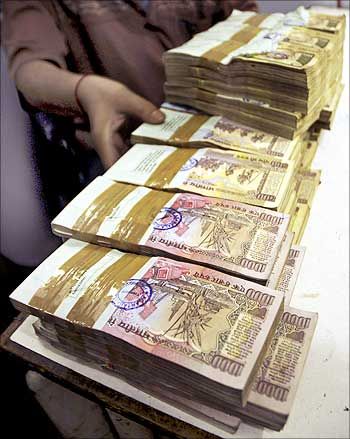 Despite a high current account deficit (CAD) and lower interest rates abroad, the Union government will not go for a sovereign bond issue to get more dollars.
Despite a high current account deficit (CAD) and lower interest rates abroad, the Union government will not go for a sovereign bond issue to get more dollars.
The finance ministry feels the time is not appropriate for issuing dollar-denominated sovereign bonds, particularly when gold and crude oil prices have started heading down, which should reduce the CAD.
Officials said sovereign bonds can address the financing problems of the CAD and the infrastructure sector. The CAD, which swelled to 6.7 per cent in October-December 2012-13, is expected to be lower in the January-March quarter, aided by a surge in exports.
The issue of infrastructure financing can be better addressed, they say, by external commercial borrowing (ECB) and infrastructure debt funds (IDFs).
“There is no proposal to go for a sovereign bond issue. This is not the right time, as the rupee is depreciating. Issuing the debt in dollars will further increase the country’s external debt,” a finance ministry official, who did not wish to be identified, told Business Standard.
Another official said sovereign bonds should be a last resort. For, it might send a wrong signal to outsiders, that the economy was in a crisis.
He added there were many complexities with regard to such bonds - they have to be carefully planned, with the end-use in mind and should come in various maturities, to prevent a sudden outflow.
Though interest rates are lower abroad, the government will have to offer a Libor-plus spread, depending on its sovereign rating. Since India has the lowest investment grade, making its bonds
“These bonds will be very attractive for foreign investors, as nowhere in the world would they get these kinds of returns,” said another official. “Besides, there is no risk of currency fluctuation for investors in dollar-denominated bonds. That risk will be faced by the government here. But the bigger question is, do we really need to go for sovereign bonds and limit the resources available for the private sector?”
Devendra Kumar Pant, director, India Ratings & Research, said there was not much demand at present for foreign funds from the corporate sector. Yet, as the industry requirement picked up, a sovereign bond might crowd out private sector investment. Looking at the kind of capital inflows the country was getting, he added, one would have to take a careful call on how the debt would be serviced.
The Reserve Bank of India is also averse to the idea of a sovereign bond, fearing volatile yields on these could affect those of the 10-year benchmark government bond in India.
India had resorted to foreign-currency denominated sovereign bonds in a crisis. It had first issued quasi-sovereign debt bonds through State Bank of India in 1991, when the country was facing a balance of payments crisis.
Thereafter, such bonds were issued in 1998, when India faced sanctions from the US following the second Pokhran nuclear tests, and in 2000, to shore up forex reserves. Today, however, its foreign exchange reserve position is comfortable, at about $295 billion.
The government has not dug into its dollar reserves despite a higher CAD, except marginally in the second quarter of 2012-13.











